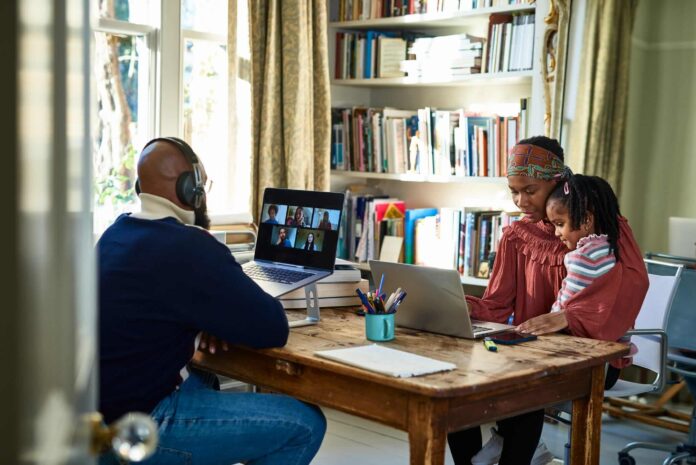In the wake of the COVID-19 pandemic, the workforce has undergone a significant transformation, with remote work becoming the new norm. As organizations adapt to this new reality, they face the challenge of building and managing effective multigenerational teams. With individuals from different age groups and backgrounds working together, it is essential to foster collaboration, communication, and productivity. Here we will explore strategies to form effective multigenerational teams in the post-COVID era, backed by recent surveys and the use of remote PC monitoring software.
Overcoming Generational Differences

Promote Open Communication
Clear and effective communication is essential for any team’s success. Encourage open dialogue, active listening, and the sharing of ideas and perspectives. Create platforms and spaces for team members to express themselves and feel heard, irrespective of their age or position within the organization.
Encourage Mutual Mentorship
Encourage the exchange of knowledge and skills between different generations through mentorship programs. Younger employees can benefit from the wisdom and experience of older colleagues. Senior employees can learn from the fresh perspectives and technological expertise of younger team members. Mutual mentorship promotes learning, strengthens relationships, and enhances overall team performance.
Promoting Digital Literacy in the Workplace
In our rapidly evolving digital age, it’s crucial to ensure that all team members, regardless of age or background, are proficient in essential digital skills. This is what we refer to as ‘Digital Literacy’. It is not merely about being able to operate digital tools, but rather understanding and utilizing them effectively for communication and collaboration. Especially in remote or hybrid work environments, digital literacy can be the make-or-break factor for seamless team collaboration.
Investing in comprehensive training programs and resource materials to bolster digital literacy is not just an option, but a strategic imperative. By doing so, businesses can augment productivity, foster inclusivity, and empower their teams to confidently navigate the digital world. Remember, digital literacy is no longer just an individual’s asset – it has become a collective strength, a bonding agent that transforms diverse teams into a cohesive, high-performing unit in the digital landscape.
Embracing Flexibility and Adaptability

COVID-19 pandemic has emphasized the need for organizations and teams to be flexible and adaptable. Here are additional strategies to embrace flexibility and effectively manage multigenerational teams:
Accommodate Different Work Styles
Recognize that different generations may have varying work preferences and styles. Some may prefer more structured schedules. Some others thrive in a flexible work environment. Encourage team members to discuss their preferences and find common ground that allows for collaboration and productivity.
Provide Training and Upskilling Opportunities
Investing in continuous learning and development benefits employees of all age groups. Provide training programs and upskilling opportunities to ensure that each team member can stay relevant in an ever-evolving workplace. By empowering employees to acquire new skills and knowledge, organizations foster a culture of growth and adaptability.
Building a Culture of Inclusion and Respect

Inclusive and respectful workplaces are essential for effective multigenerational teams to thrive. Consider the following strategies to promote a culture of inclusion:
Value Each Individual’s Contributions
Ensure that all team members, regardless of their age or background, feel valued and respected for their contributions. Encourage diverse perspectives and ideas, and recognize achievements across generations. By promoting a sense of belonging, organizations can cultivate an inclusive environment that fosters collaboration and innovation.
Address Generational Stereotypes
Challenging and debunking generational stereotypes is crucial for building strong multigenerational teams. Encourage team members to understand and appreciate the strengths and experiences that each generation brings to the table. By dispelling biases and fostering mutual respect, organizations can overcome intergenerational conflicts and create a harmonious work environment.
Promoting Work-Life Integration

While work-life balance is important, the concept of work-life integration recognizes that personal and professional lives are interconnected. Here are strategies to promote work-life integration within multigenerational teams:
Set clear boundaries and Expectations
Establish clear expectations regarding work hours, availability, and communication channels. Encourage team members to define boundaries that allow them to manage their personal and professional responsibilities effectively. By promoting transparency and open communication, organizations can ensure that everyone’s needs are respected.
Foster a supportive and flexible work environment
Provide resources and support systems that help employees balance their personal and professional commitments. This can include flexible work arrangements, access to wellness programs, and initiatives that promote work-life integration. By prioritizing the holistic well-being of team members, organizations create a culture that supports work-life integration.
Enhancing Collaboration and Team Bonding

Effective collaboration and strong team bonding are crucial for the success of multigenerational teams. Consider the following strategies to enhance collaboration and foster strong relationships:
Encourage Cross-Generational Team Projects
Assign projects that require collaboration across different generations. This allows team members to learn from one another, share their expertise, and develop a deeper understanding of each other’s perspectives. Cross-generational projects promote teamwork, trust, and the exchange of valuable knowledge.
Facilitate Team-Building Activities
Organize team-building activities that encourage social interaction and bonding. This can be done through virtual or in-person events, such as team lunches, online games, or volunteer activities. Team-building activities create a sense of camaraderie, improve communication, and strengthen relationships within multigenerational teams.
Emphasizing Continuous Feedback and Recognition

Regular feedback and recognition are essential for employee growth and motivation. Implement the following strategies to provide feedback and recognition effectively:
Implement feedback channels
Establish formal feedback channels that allow team members to share their thoughts, ideas, and concerns. This can be done through regular one-on-one meetings, anonymous surveys, or online platforms. Encouraging feedback ensures that all voices are heard and helps address any generational or communication gaps within the team.
Recognize Achievements Across Generations
Create a culture of recognition that celebrates accomplishments across different generations. Implement an employee recognition program that acknowledges individuals’ contributions and milestones, regardless of age. Recognizing achievements fosters a positive work environment and boosts morale within multigenerational teams.
Conclusion

As we navigate the post-COVID era, the formation of effective multigenerational teams is vital for organizations to succeed. Embracing diversity, fostering open communication, and leveraging technology can facilitate collaboration and unlock the full potential of a workforce comprising individuals from different age groups. Use of remote PC monitoring software provides valuable insights into team dynamics while respecting privacy boundaries. By implementing these strategies and adapting to the changing work landscape, organizations can build resilient and high-performing teams that thrive in the post-COVID era and beyond.









